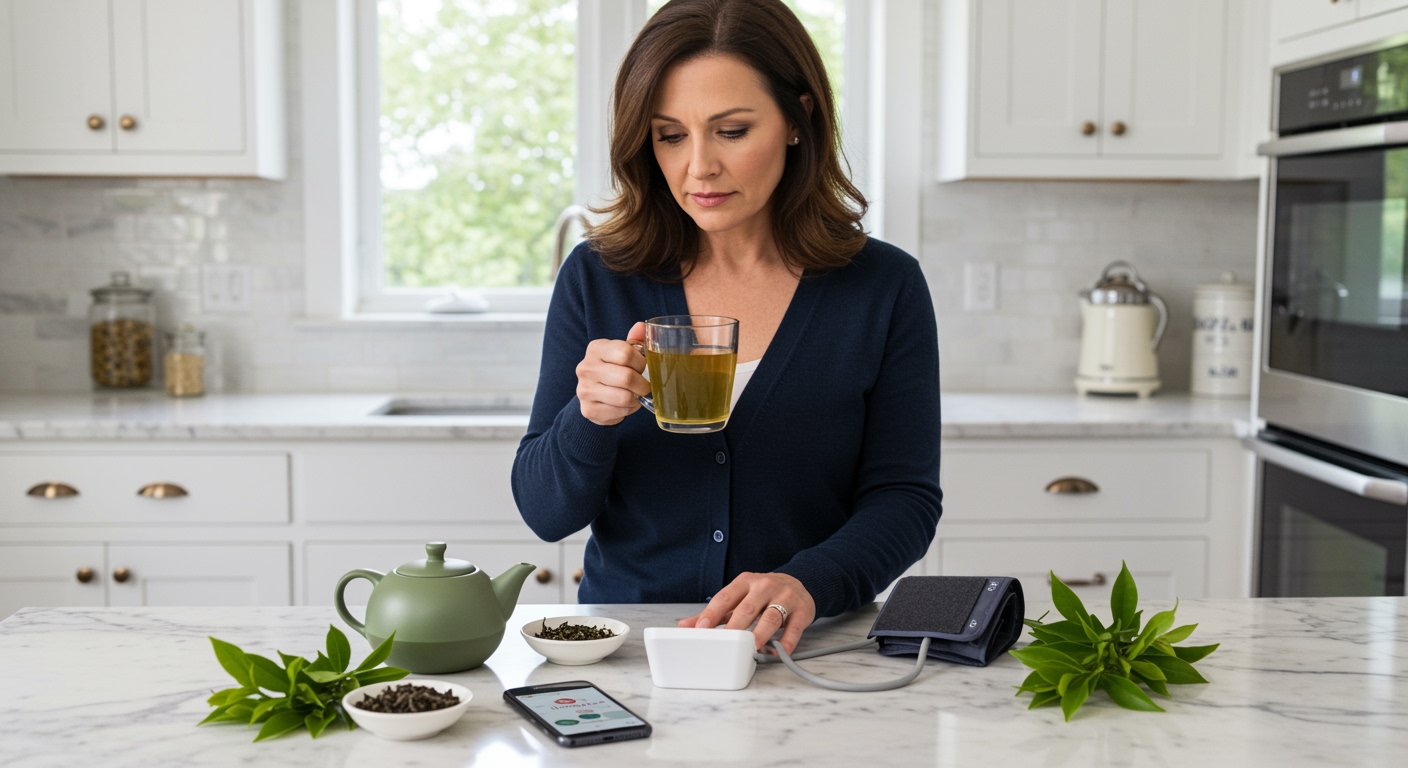✪ Key Takeaway: Green tea can lower blood pressure further, making it risky for people with existing low blood pressure conditions.
Introduction
Your morning green tea ritual might be working against you if you have low blood pressure.
Many people with hypotension wonder whether their favorite antioxidant-rich beverage could be making their condition worse, especially when they experience dizziness or fatigue after drinking it.
Hi, I’m Abdur, your nutrition coach and today I’m going to explain exactly how green tea affects low blood pressure and what you need to know to make informed decisions about your daily tea consumption.
How Does Green Tea Actually Affect Blood Pressure?
Green tea contains powerful compounds called catechins, particularly epigallocatechin gallate, which have been shown to relax blood vessels and improve blood flow.
These compounds work by increasing the production of nitric oxide in your blood vessel walls, which causes the vessels to dilate and reduces the pressure inside them.
Research published in multiple studies shows that regular green tea consumption can reduce systolic blood pressure by 2-3 mmHg and diastolic pressure by 1-2 mmHg in healthy individuals.
The caffeine in green tea provides a temporary blood pressure increase, but this effect is quickly overshadowed by the vasodilating properties of the catechins.
For people with normal or high blood pressure, this mechanism provides cardiovascular benefits and reduces heart disease risk.
✪ Fact: Green tea contains 25-50mg of caffeine per cup compared to 95mg in coffee.
What Happens When You Have Low Blood Pressure?
Low blood pressure, or hypotension, occurs when your blood pressure readings consistently fall below 90/60 mmHg.
This condition means your heart is not pumping blood with enough force to adequately supply your organs and tissues with oxygen and nutrients.
Common symptoms include dizziness, lightheadedness, fainting, fatigue, nausea, and difficulty concentrating, especially when standing up quickly.
Your body needs adequate blood pressure to ensure proper cerebral perfusion, which means getting enough blood flow to your brain to maintain normal cognitive function.
When blood pressure drops too low, your brain receives less oxygen, leading to the characteristic symptoms that make daily activities challenging.
People with chronic low blood pressure often struggle with orthostatic hypotension, where blood pressure drops significantly when changing positions from lying down to standing.
✪ Note: Some people naturally have low blood pressure without symptoms and live healthy lives.
Why Green Tea Could Make Low Blood Pressure Worse?
The same blood pressure lowering effects that make green tea beneficial for people with hypertension can be problematic for those with hypotension.
When you already have low blood pressure, the catechins in green tea can cause further vasodilation, potentially dropping your blood pressure to dangerously low levels.
This additional decrease can worsen symptoms like dizziness, weakness, and fainting spells, particularly if you drink multiple cups throughout the day.
The timing of green tea consumption also matters because drinking it on an empty stomach can intensify these effects due to faster absorption of catechins.
Many people with low blood pressure report feeling more tired or experiencing increased brain fog after drinking green tea, which contradicts the energizing effects they expect.
The diuretic properties of green tea can also contribute to dehydration, which further reduces blood volume and exacerbates low blood pressure symptoms.
✪ Pro Tip: Monitor your symptoms for 2-3 hours after drinking green tea to identify patterns.
Should You Completely Avoid Green Tea With Low Blood Pressure?
Complete avoidance is not necessary for everyone with low blood pressure, but moderation and timing become crucial factors.
Start by limiting yourself to one cup per day and observe how your body responds over the course of a week.
Drink green tea with food rather than on an empty stomach to slow the absorption of catechins and minimize their blood pressure lowering effects.
Choose weaker brews by steeping for shorter periods or using fewer tea leaves to reduce the concentration of active compounds.
Avoid drinking green tea in the morning when blood pressure naturally tends to be lower, and instead consume it during midday hours when your cardiovascular system is more active.
Stay well-hydrated throughout the day by drinking plenty of water to counteract any potential dehydrating effects from the tea.
If you experience worsening symptoms after implementing these modifications, consider switching to white tea or herbal teas that do not contain catechins.
✪ Fact: White tea contains fewer catechins than green tea while still providing antioxidant benefits.
What Are Better Alternatives For Low Blood Pressure?
Several beverages can provide health benefits without the blood pressure lowering effects of green tea.
Black tea contains similar antioxidants but has less impact on blood pressure due to different processing methods that reduce catechin content.
Herbal teas like ginger, peppermint, or chamomile offer therapeutic benefits without affecting your cardiovascular system in ways that could worsen hypotension.
Coffee in moderate amounts can actually help raise blood pressure temporarily due to its higher caffeine content, making it a better choice for some people with low blood pressure.
Beetroot juice has been shown to support healthy blood pressure regulation through natural nitrates that improve circulation without causing dramatic drops.
Coconut water provides natural electrolytes that help maintain proper blood volume and support cardiovascular function in people with hypotension.
✪ Pro Tip: Add a pinch of sea salt to your beverages to help maintain blood volume naturally.
The Bottom Line
Green tea can indeed worsen low blood pressure symptoms due to its natural ability to relax blood vessels and reduce blood pressure further.
Your health comes first, and sometimes that means modifying even the healthiest habits to match your individual needs.
I would love to hear about your experiences with green tea and low blood pressure in the comments below, or if you have any questions about managing hypotension through dietary choices.
References
At NutritionCrown, we use quality and credible sources to ensure our content is accurate and trustworthy. Below are the sources referenced in creating this article:





